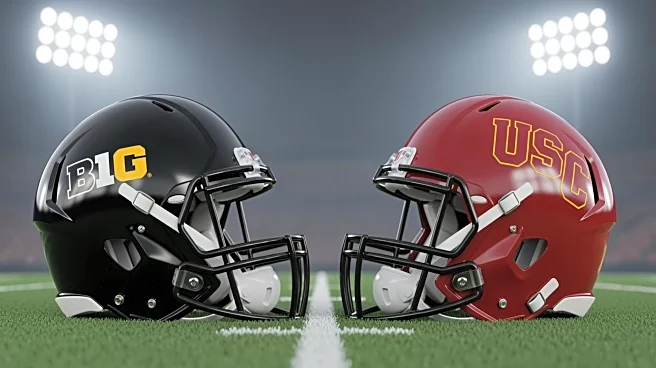What's Happening?
The Big Ten Conference has announced that the University of Southern California (USC) should have been penalized for unsportsmanlike conduct during their recent game against Northwestern. The issue arose
when USC's third-string quarterback, Sam Huard, wore the same jersey number as the team's regular punter, Sam Johnson, during a fake punt play. Huard, wearing jersey No. 80, completed a pass that led to a touchdown, contributing to USC's 38-17 victory. According to the NCAA's 'Unfair Tactics' rule, two players playing the same position cannot wear the same number during a game. The Big Ten is reviewing the situation with both schools involved.
Why It's Important?
This incident highlights the importance of adherence to NCAA rules and the potential impact of rule violations on game outcomes. The use of duplicate jersey numbers in college football is common, but typically involves players on different sides of the ball. The Big Ten's decision to review the situation underscores the need for transparency and fairness in sports. The outcome of this review could influence future enforcement of similar rules, affecting team strategies and game integrity. Stakeholders such as coaches, players, and fans are keenly interested in maintaining fair play standards.
What's Next?
The Big Ten will continue to investigate the matter, potentially leading to further actions or clarifications regarding the use of jersey numbers in games. This could result in stricter enforcement of existing rules or the introduction of new guidelines to prevent similar occurrences. Coaches and teams may need to adjust their roster management practices to ensure compliance with NCAA regulations. The outcome of this review could also prompt discussions among other conferences about rule enforcement and game integrity.
Beyond the Headlines
The incident raises questions about the ethical dimensions of sportsmanship and the lengths teams might go to gain a competitive edge. It also highlights the role of regulatory bodies in maintaining the integrity of sports. The broader implications could include a reevaluation of how rules are communicated and enforced across college sports, potentially leading to more stringent oversight and accountability measures.










